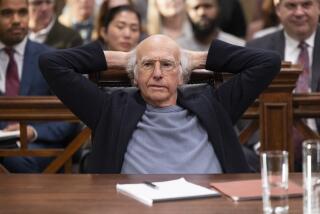Review: The return of the return of ‘Arrested Development,’ still funny after all these years
Five years after the return of “Arrested Development” as a Netflix series, which came seven years after it was canceled as a Fox sitcom, “Arrested Development” returns again Tuesday to follow the misadventures of the Bluths of Newport Beach. The show now appears with the frequency of new U2 albums.
The new season — its fifth since 2003, again on Netflix — was negatively heralded by a much-discussed group interview in the New York Times, in which male cast members, led by Jason Bateman, seemed to defend, even to mansplain, the behavior of Jeffrey Tambor, who had been verbally abusive to Jessica Walter. (Portia de Rossi, who had decided to stop acting before production of the current season began but agreed to appear in five episodes, did not take part.) Apologies were subsequently issued, but a wary Netflix nixed a planned promotional trip to England.
That Tambor has been let go from Jill Soloway’s Amazon series “Transparent” after allegations of sexual harassment also makes watching the new season strange at times. That’s especially true during a storyline in which Tambor, as patriarch George Bluth, and his bad magician son, Gob (Will Arnett), agree to cut a sexual swath across Mexico, although each is lying to the other about wanting to do it. (Viewers will recall that Gob is in love with fellow magician Tony Wonder, played by Ben Stiller.) It’s not fatal to the show, but you will make up your own mind about that.
The series, created by Mitchell Hurwitz, remains loosely organized around Michael Bluth (Bateman), the relatively normal son (with a relatively normal son of his own, George-Michael Bluth, played by Michael Cera), whose periodic attempts to distance himself from his family ever fail: “You always come back to save the family, Michael,” his brother Buster (Tony Hale) says this season. “We joke about it all the time.”
They are a television family, which is to say, they are fated to remain more or less in one another’s company — to share sitcom space, at least, if not always scenes — driven apart and drawn together until the day they are forever canceled or their makers let them go. But this dynamic is woven into the fabric of “Arrested Development” more tightly than usual; a line of narration sums up the Bluth dilemma nicely: “Resentful of his family, Michael came up with a plan to make them come back.”
It is a devilish contraption, a finely worked out farce that marshals the classic tools of mistaken identities, misheard statements, cross purposes, backfiring deceptions and a desire for sex into a modern serial sitcom. With the exception of Michael and George-Michael, whose attempts to be bad go awry as reliably as his attempts to do good, the Bluths are variously dishonest, deluded, incorrigible and incompetent; one of them is typically trying to get even with another one of them, or all of them — though they are not without feelings and a need to be loved. Usually, one of them is imprisoned, or in disguise, or being impersonated by someone else. In one of the new season’s best conceits, Michael’s niece Maeby is hiding out as an old Jewish woman in a fancy retirement home.
The puzzle-piece aspect of the show was taken a step further in structuring the fourth season, where the same story was told following a different character in each episode. It was a one-time-only experiment that seemed designed to answer the question, “How do we do something different now that we’ve been away for five years and are coming back as a streaming series?”
In 2013, we were not yet living in a world of revivals; something clever seemed to be called for. (And now that season has been re-edited chronologically; you can find it also on Netflix, as “Arrested Development: Remix: Fateful Consequences.”)
The new season returns to it single-timeline roots and takes up its business directly on the heels of the fourth, the five-year real-world hiatus not withstanding. (Though somehow it is also 2016, and Trump is running for president.) It breaks no new ground, and it goes over old ground in a way that feels odd to call “pleasing,” given the rampant dysfunction, but somehow is.
Old business is helpfully rehashed by narrator Ron Howard, who is also an executive producer and plays himself within the series, but a working knowledge of earlier seasons is helpful to begin: The last one did not end on a note of resolution. (The apparent death of neighbor Lucille Austero, played by Liza Minnelli, is a plot driver in Season 5.) And close attention should be paid going forward. So much happens that by the time I had reached the eighth episode of the new 16-episode season — the second eight will premiere later in the year — I had forgotten much from the first.
At the same time, it’s possible to enjoy “Arrested Development” with a sense of “I don’t know what’s happening in this scene exactly” or “I’m not sure how this fits into the big picture, but OK.” Even without understanding the running jokes and the allusions to things many viewers cannot possibly remember (but which obsessed viewers helpfully catalog online), the dynamics of any scene are fairly clear. (It’s not exactly like reading “Ulysses” without a guide, because it’s not “Ulysses,” but it’s not dissimilar.)
The music of the jokes is satisfying, whatever their import, and you always know where a character is in danger of putting a foot in the mouth or making some fatal miscalculation. And through it all, there is the voice of Howard — a happy sound for Americans who remember the 20th century.
‘Arrested Development’
Where: Netflix
When: Any time
Rating: TV-14 (may be unsuitable for children under the age of 14)
Follow Robert Lloyd on Twitter @LATimesTVLloyd
ALSO
Season 4 review: ‘Arrested Development’ makes a joyous return
‘Transparent’ to end, ‘Arrested Development’ to debut and more from Jeffrey Tambor
‘Arrested Development’s’ return a Bluth saga in itself
More to Read
The complete guide to home viewing
Get Screen Gab for everything about the TV shows and streaming movies everyone’s talking about.
You may occasionally receive promotional content from the Los Angeles Times.







